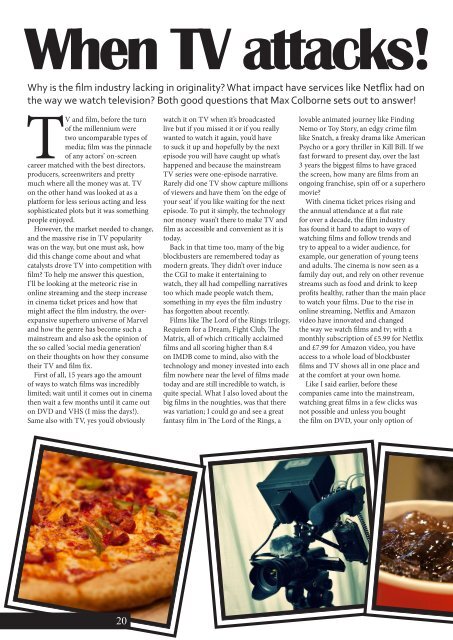EXTROVERT WINTER 2017
Leeds City College Year 2 Journalism students produce a magazine for the college student community.
Leeds City College Year 2 Journalism students produce a magazine for the college student community.
Create successful ePaper yourself
Turn your PDF publications into a flip-book with our unique Google optimized e-Paper software.
When TV attacks!<br />
Why is the film industry lacking in originality? What impact have services like Netflix had on<br />
the way we watch television? Both good questions that Max Colborne sets out to answer!<br />
TV and film, before the turn<br />
of the millennium were<br />
two uncomparable types of<br />
media; film was the pinnacle<br />
of any actors’ on-screen<br />
career matched with the best directors,<br />
producers, screenwriters and pretty<br />
much where all the money was at. TV<br />
on the other hand was looked at as a<br />
platform for less serious acting and less<br />
sophisticated plots but it was something<br />
people enjoyed.<br />
However, the market needed to change,<br />
and the massive rise in TV popularity<br />
was on the way, but one must ask, how<br />
did this change come about and what<br />
catalysts drove TV into competition with<br />
film? To help me answer this question,<br />
I’ll be looking at the meteoric rise in<br />
online streaming and the steep increase<br />
in cinema ticket prices and how that<br />
might affect the film industry, the overexpansive<br />
superhero universe of Marvel<br />
and how the genre has become such a<br />
mainstream and also ask the opinion of<br />
the so called ‘social media generation’<br />
on their thoughts on how they consume<br />
their TV and film fix.<br />
First of all, 15 years ago the amount<br />
of ways to watch films was incredibly<br />
limited; wait until it comes out in cinema<br />
then wait a few months until it came out<br />
on DVD and VHS (I miss the days!).<br />
Same also with TV, yes you’d obviously<br />
watch it on TV when it’s broadcasted<br />
live but if you missed it or if you really<br />
wanted to watch it again, you’d have<br />
to suck it up and hopefully by the next<br />
episode you will have caught up what’s<br />
happened and because the mainstream<br />
TV series were one-episode narrative.<br />
Rarely did one TV show capture millions<br />
of viewers and have them ‘on the edge of<br />
your seat’ if you like waiting for the next<br />
episode. To put it simply, the technology<br />
nor money wasn’t there to make TV and<br />
film as accessible and convenient as it is<br />
today.<br />
Back in that time too, many of the big<br />
blockbusters are remembered today as<br />
modern greats. They didn’t over induce<br />
the CGI to make it entertaining to<br />
watch, they all had compelling narratives<br />
too which made people watch them,<br />
something in my eyes the film industry<br />
has forgotten about recently.<br />
Films like The Lord of the Rings trilogy,<br />
Requiem for a Dream, Fight Club, The<br />
Matrix, all of which critically acclaimed<br />
films and all scoring higher than 8.4<br />
on IMDB come to mind, also with the<br />
technology and money invested into each<br />
film nowhere near the level of films made<br />
today and are still incredible to watch, is<br />
quite special. What I also loved about the<br />
big films in the noughties, was that there<br />
was variation; I could go and see a great<br />
fantasy film in The Lord of the Rings, a<br />
lovable animated journey like Finding<br />
Nemo or Toy Story, an edgy crime film<br />
like Snatch, a freaky drama like American<br />
Psycho or a gory thriller in Kill Bill. If we<br />
fast forward to present day, over the last<br />
3 years the biggest films to have graced<br />
the screen, how many are films from an<br />
ongoing franchise, spin off or a superhero<br />
movie?<br />
With cinema ticket prices rising and<br />
the annual attendance at a flat rate<br />
for over a decade, the film industry<br />
has found it hard to adapt to ways of<br />
watching films and follow trends and<br />
try to appeal to a wider audience, for<br />
example, our generation of young teens<br />
and adults. The cinema is now seen as a<br />
family day out, and rely on other revenue<br />
streams such as food and drink to keep<br />
profits healthy, rather than the main place<br />
to watch your films. Due to the rise in<br />
online streaming, Netflix and Amazon<br />
video have innovated and changed<br />
the way we watch films and tv; with a<br />
monthly subscription of £5.99 for Netflix<br />
and £7.99 for Amazon video, you have<br />
access to a whole load of blockbuster<br />
films and TV shows all in one place and<br />
at the comfort at your own home.<br />
Like I said earlier, before these<br />
companies came into the mainstream,<br />
watching great films in a few clicks was<br />
not possible and unless you bought<br />
the film on DVD, your only option of<br />
20







